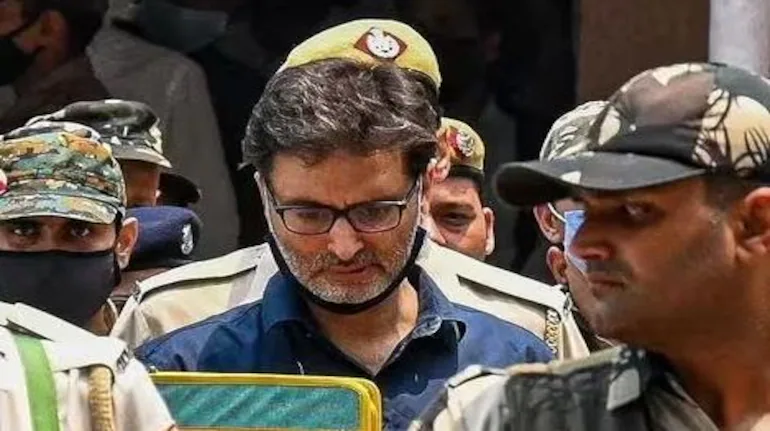The Tribunal handling matters under the Unlawful Activities (Prevention) Act (UAPA) has upheld the Union Home Ministry’s decision to extend the ban on the Jammu and Kashmir Liberation Front (JKLF) as an unlawful association for an additional five years.
On March 15, 2024, the Union Ministry of Home Affairs (MHA) extended the ban on the Jammu and Kashmir Liberation Front (JKLF), led by Yasin Malik, who is currently imprisoned on terror charges.
The UAPA tribunal, chaired by Justice Neena Bansal Krishna of the Delhi High Court, upheld this decision, stating that there is no tolerance for associations that openly promote secessionism.
UAPA Tribunal, however, noted, “Even though Md. Yasin Malik repeatedly claimed during proceedings that he had given up armed resistance and was following a Gandhian mode of struggle to achieve their professed aim since 1994, his proclivity to continue to engage with violent means and with entities/persons who are avowedly committed to violent means are too stark to be ignored”.
“He has not only been engaging with wanted terrorists but has even admitted to having visited a terrorist camp in POK where he has been felicitated as well. In his reply cum affidavit, Md. Yasin Malik has sought to explain these aspects but the same is patently a superficial effort to explain just for the sake of it”, said the court.
The investigation conducted by the NIA and subsequently by the Enforcement Directorate reveals that Yasin Malik has been at the forefront of using illegally mobilized funds for aiding violent activities in Jammu & Kashmir.
Testimony of the witness from the NIA brings out how JKLF-Y is intricately involved in the process of not only mobilizing funds to further the secessionist aims of JKLF-Y but also in organizing violent protests across the Kashmir valley.
The first charge-sheet in 2018 filed by the NIA brings out a well-organized hierarchical structure of the APHC leadership to continue with violent means to achieve secession of Jammu & Kashmir under the cloak of APHC’s socio-political umbrella, said the court.
At the top of this hierarchical structure sits, amongst others, SAS Geelani, Md. Yasin Malik and Mirwaiz Umar Farooq who are the chief organizers of the resistance movement classified as Joint Resistance Leadership by the separatists, added the court.
During the hearing before the UAPA tribunal, Yasin Malik, convicted of terror financing and serving a life sentence, stated that he had renounced armed struggle in favour of a Gandhian approach to resist what he perceives as Indian occupation of Jammu and Kashmir.
Malik, as the sole witness for the Jammu and Kashmir Liberation Front (JKLF-Y), submitted a reply cum affidavit detailing his belief that armed struggle was the only path to fulfil the aspirations of the Kashmiri youth. He expressed that he later adopted a peaceful resistance approach, claiming engagement with central government officials to seek a dialogue for resolving the Kashmir issue.
His affidavit included references to Urdu poetry to justify his struggle for secession and contained allegations against senior police and intelligence officials, which the tribunal found largely irrelevant to the current proceedings. Malik argued that since the JKLF-Y was banned in 2019, there have been no unlawful activities warranting the reimposition of the ban. Additionally, he addressed various allegations against JKLF-Y, including visits to terrorist camps, connections with the Pakistani military, and receiving illegal funds from a hawala operator. (ANI)
An Intro of Libration Front
The Jammu Kashmir Liberation Front (JKLF) is a political organisation and former militant group that seeks the independence of Jammu and Kashmir from both India and Pakistan. Formed in the 1970s, the JKLF initially started as a militant group advocating for an independent and sovereign Kashmir. It played a significant role in the armed insurgency in the Kashmir Valley during the late 1980s and early 1990s. Over time, the group has shifted its focus to non-violent political advocacy, calling for the right to self-determination for the people of Jammu and Kashmir. However, the JKLF remains a controversial organisation, facing opposition and bans in various countries, including India, for its earlier militant activities. The group’s struggle symbolises the larger conflict in the region, with deep-rooted political, territorial, and ethnic tensions between India, Pakistan, and the people of Kashmir.
You May Like:
Two drug peddlers Arrested by Police Post Mirbazar in Kulgam
Ravi Shastri: J&K Youth are Talented; Right Exposure Can Help Them Achieve Great Heights

